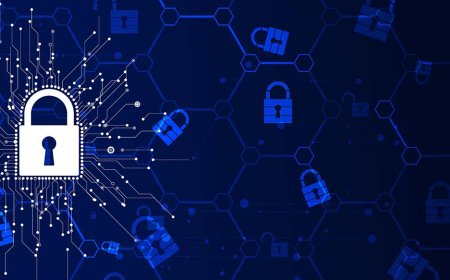Unveiling the Importance of Cybersecurity
The importance of cybersecurity in protecting data, preventing cyber threats, and ensuring online safety. Learn key strategies to safeguard businesses and individuals from cyber risks.

Technology is a big part of our connected lives, which makes cybersecurity more important than ever. We depend on digital platforms for many parts of our everyday lives, thus it is critical to safeguard private data and uphold public confidence online. By providing defense against changing threats, cybersecurity ensures the durability of our digital environment. It is important for maintaining system integrity and creating a safe atmosphere for people, companies, and governments.
The Need for All-encompassing Cybersecurity
Businesses, people, and governments all struggle with the complicated digital environment of our day. The risk of cyberattacks is increased with increased connectivity, which emphasizes the critical need for a comprehensive understanding of the consequences of cybersecurity. Ignoring these issues can have dire repercussions, which highlights how crucial it is to take a deliberate and knowledgeable approach to protecting against changing cyber threats.
The Complex Web: Safeguarding Against Evolving Cyber Threats
A major concern is the variable spectrum of cyber threats, which can range from sophisticated ransomware operations to phishing schemes. Cybercriminals are always improving their strategies and taking advantage of weaknesses to cause significant financial and reputational damage. The consequences go beyond financial losses; they affect people's and organizations' confidence and trust. Protecting against the intricate web of difficulties presented by cybercriminal activity requires being watchful and responding to these changing dangers.
Why is cybersecurity so crucial in the face of these evolving threats?
The answer lies in safeguarding sensitive information, maintaining the integrity of systems, and preserving the trust of users and customers.
Let's delve deeper into the key aspects that highlight the importance of cybersecurity.
1. Protection of Sensitive Data
In the digital age, data is a currency of its own. Companies store vast amounts of sensitive information, from customer details to proprietary business strategies. A breach in cybersecurity could lead to unauthorized access, compromising this valuable data. The consequences range from financial losses to legal repercussions, emphasizing the need for robust cybersecurity protocols.
2. Preserving Business Continuity
Cyberattacks can cripple businesses, disrupting operations and causing downtime. Whether it's a ransomware attack or a distributed denial-of-service (DDoS) attack, the fallout can be severe. Cybersecurity measures act as a shield, ensuring the continuity of business operations even in the face of malicious attempts to disrupt them.
3. Building and Retaining Trust
Trust is the cornerstone of any successful business or online platform. A single cyber incident can erode the trust that users and customers place in an organization. Cybersecurity is not just about protecting data; it's about safeguarding the trust of stakeholders. Establishing a secure online environment fosters confidence, encouraging users to engage without fear of compromise.
4. Mitigating Financial Risks
Cyberattacks come with a hefty price tag. The financial repercussions of a data breach or a system compromise can be staggering. Cybersecurity investments serve as a preventive measure, mitigating the potential financial risks associated with recovering from an attack and rebuilding damaged reputations.
The Scale of the Cyber Security Threat
Diverse Nature of Threats
The cybersecurity threat scenery is diverse, encompassing a range of malicious activities. From phishing attempts and malware infections to more sophisticated attacks like ransomware and advanced persistent threats (APTs), the variety of threats poses a continuous challenge to individuals and organizations.
Global Reach and Impact
One of the defining features of cybersecurity threats is their global reach. Cybercriminals operate on a scale that transcends geographical boundaries. An attack on one corner of the world can have ripple effects, affecting individuals and businesses far beyond the initial target. This interconnectedness amplifies the importance of a collective and global approach to cybersecurity.
Targeting Individuals and Organizations
Cyber threats are not exclusive to large corporations or governments. Individuals, small businesses, and non-profit organizations are equally susceptible. Cybercriminals often exploit vulnerabilities at any level, making it essential for everyone to be aware and proactive in implementing cybersecurity measures.
Constant Evolution of Tactics
The view of cyber threats is dynamic, with attackers continuously evolving their tactics. As security measures improve, so do the methods employed by cybercriminals. This constant cat-and-mouse game requires a sustained commitment to staying informed, adapting defenses, and being prepared for emerging threats.
Economic and Social Implications
The scale of the cybersecurity threat goes beyond the digital realm; it has real-world economic and social implications. The financial losses incurred due to cyber incidents, coupled with the erosion of trust, can have lasting effects on businesses and communities. As our reliance on digital platforms grows, so does the potential impact of cyber threats on our daily lives.
How Does Cyber Security Work? The Challenges of Cyber Security
Cyber security encompasses technologies, processes, and methods to defend computer systems, data, and networks from attacks. To best answer the question What is cyber security and how cyber security works, we must divide it into a series of subdomains:
Application Security
Application security covers the implementation of different defenses in an organization’s software and services against a diverse range of threats. This sub-domain requires cyber security experts to write secure code, design secure application architectures, implement robust data input validation, and more, to minimize the chance of unauthorized access or modification of application resources.
Cloud Security
Cloud security relates to creating secure cloud architectures and applications for companies that use cloud service providers like Amazon Web Services, Google, Azure, Rackspace, etc.
Identity Management and Data Security
This subdomain covers activities, frameworks, and processes that enable authorization and authentication of legitimate individuals to an organization’s information systems. These measures involve implementing powerful information storage mechanisms that secure the data, whether in transition or residing on a server or computer. In addition, this sub-domain makes greater use of authentication protocols, whether two-factor or multi-factor.
Mobile Security
Mobile security is a big deal today as more people rely on mobile devices. This subdomain protects organizational and personal information stored on mobile devices like tablets, cell phones, and laptops from different threats like unauthorized access, device loss or theft, malware, viruses, etc. In addition, mobile security employs authentication and education to help amplify security.
Network Security
Network security covers hardware and software mechanisms that protect the network and infrastructure from disruptions, unauthorized access, and other abuses. Effective network security protects organizational assets against a wide range of threats from within or outside the organization.
Disaster Recovery and Business Continuity Planning
Not all threats are human-based. The DR BC subdomain covers processes, alerts, monitoring, and plans designed to help organizations prepare for keeping their business-critical systems running during and after any sort of incident (massive power outages, fires, natural disasters), and resuming and recovering lost operations and systems in the incident’s aftermath.
User Education
Knowledge is power, and staff awareness of cyber threats is valuable in the cyber security puzzle. Giving business staff training on the fundamentals of computer security is critical in raising awareness about industry best practices, organizational procedures and policies, and monitoring, and reporting suspicious, malicious activities. This subdomain covers cybersecurity-related classes, programs, and certifications.
cybersecurity is paramount in our interconnected digital age, protecting sensitive data, ensuring business continuity, and preserving trust. The evolving nature and global reach of cyber threats necessitate a comprehensive approach, addressing challenges in application security, cloud security, identity management, mobile security, network security, and disaster recovery. As technology advances, user education becomes a crucial component. Cybersecurity's economic and social implications underscore the urgency for collective efforts to stay ahead in this dynamic landscape, safeguarding our digital future.






























































